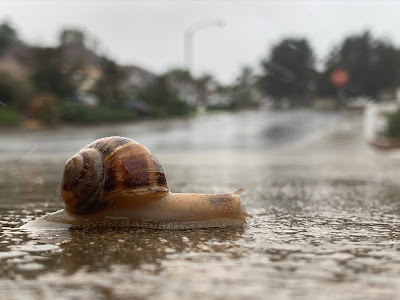Yesterday was a good day to be a snail. Spring rains are rousing them from hibernation, and on my morning stroll I saw hundreds cruising the vacant sidewalks of suburban Riverside.
The streets were so quiet, even this snail appeared to be in no particular danger:
I took dozens of photos in the rain, my usual fifty-five minute walk stretching to an hour and a quarter. It was peaceful -- just me and the snails. Normally on a Monday morning, cars fill the streets, leaving for work and school. Yesterday I counted only fourteen cars the whole time I was out, less than one car every five minutes. Nor were there other pedestrians.
Alone in the rain with the snails, I thought back to couple of days previously, when my wife Pauline, my teenage daughter Kate, and I had been walking our dog in the sun. Pauline had wondered aloud if the world would be better without humans. Think of all the destruction and suffering we cause, she said.
But without humans, I replied, there'd be no science, no philosophy, no art, no heroes -- none of the distinctively human things that make Earth such an amazing planet! Isn't it better that the universe has planets like this, even with all the suffering we inflict on ourselves and other species, than it would be if every planet were just a paradise of cows?
But how much destruction and suffering is worth it, Pauline asked. What if we wiped out every species, including ourselves, and turned the planet into a sterile rock forever? Would our great accomplishments have been worth it?
Probably not, I conceded. But if we wiped out 90% of species and then the world recovered, with new wonderful species emerging later -- then we were worth it.
Kate had been listening in. I asked her opinion.
"The world would be better without humans," Kate said. She loves animals. She was thinking, I'm sure, of all the wild animals that would flourish better without us.
Two antinatalists in my own family!
I'll give Pauline and Kate this much: It's not a bad thing to let the snails to enjoy a day without us once in a while. I've noticed more birds and squirrels recently too. We humans can tuck in for a nap and let some other species cruise around for a while, in our suddenly quieter spaces.

------------------------------------------
If you enjoy my blog, check out my recent book: A Theory of Jerks and Other Philosophical Misadventures.







4 comments:
What a nice post (and awesome photos)! You always have a knack for making potentially distressing lines of thought seem playful and fun.
I suppose I fall somewhere in-between you and your family members.
From the perspective of humans, it would certainly be worse if no humans existed. From the perspective of the planet, I suspect it doesn't make much of a difference one way or the other. Humans, no humans, or no animal life at all, the planet will go on with its business as usual. "Goodness" and "badness", I think, are likely human conceptions. No humans, no problems.
But I do see the appeal of a universe with creatures like us in it as apposed to one without. For me, though, it's more of an imaginative exercise than an objective fact. For example, wouldn't it be cool if we found a species of ant somewhere out in the rain forest that did human-like things? Maybe they design clothing to better survive the elements, but then launch an entire fashion industry based on aesthetic principles they come up with. Or maybe they launch little machines into the sky around them so they can bounce invisible signals of it and talk to each other at great distances. Or perhaps they create whole professions of ants that go and look at other "lesser" species, only to write papers about how different and superior they are. How amazed and stupefied would we be to find something like that? Wouldn't it be better than not finding those ants at all?
Well, wouldn't it also be amazing for someone to find something like us in the universe, flaws and all? I think I agree it might be.
These thoughts brought to you by California's COVID-19 stay at home order.
Thanks for the kind words and thoughtful comment, Chris! :-)
It would be amazing to find ants like that. I think our huge universe must have such things, even if we humans are too spatiotemporally distant to ever encounter them. I don't want to be too much of a speciesist, and when thinking about 90% extinction and then recovery, I was imagining some other species doing its thing later, which wouldn't happen if we genuinely sterilized the planet. But I do want to hold on to some sort of value objectivism -- a variety of value objectivism on which a planet's hosting such amazing things as science, sport, and fashion is objectively awesome, even if happiness isn't thereby maximized.
I find it difficult to think about how to judge between the value of different ecosystems without humans. However, as a practical note, I don't see how it would be possible to "genuinely [sterilize] the planet" even if we wanted to [*]. I don't think we could get rids of ants, or beetles, even if there was (for some bizarre reason) a concerted worldwide effort by the human race to do so. We could kill off all large mammals, and most bird species, but we're almost certain to leave enough species for eventual recovery after we're done.
[*] I'm just thinking of things like nuclear war, or pollution. There may in the distant future be science fiction scenarios that would do it, like sucking the Earth into an artificial black hole, or using rockets to push the Earth into the sun.
Autumnal: Yes, full sterilization is probably beyond our current capacities. Life is resilient, even when most large species die!
Post a Comment